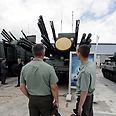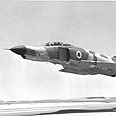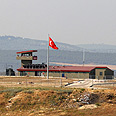


Russian technicians played a key part in the interception and shooting down of a Turkish warplane by Syria’s anti-aircraft defenses 10 days ago, Britain's Sunday Times reported Sunday. Diplomatic sources in the Middle East told the paper that destroying the F-4E Phantom II was a split-second decision intended as a warning to NATO to stay out of Syria’s civil war.
A source in Israel's Air Force was quoted as saying “we would not be surprised if these Russian experts, if they didn’t push the button, at least were beside the Syrian officers who did it."
Related articles:
- Russia: Assad not required to step down
- Syria: We thought downed Turkish plane was Israeli
- Turkey deploys anti-aircraft guns to Syria border
The downing of the plane pushed Ankara closer to military intervention in Syria as Turkish troops and tanks were deployed near the border with Syria. Damascus responded by sending two tank brigades to the border.
A long-standing client of the old Soviet Union, Syria has acquired sophisticated air defenses from Moscow over the past four decades and is seen as President Vladimir Putin’s last friend in the Arab world, opposition sources say.
An international conference held in Geneva Saturday accepted a UN-brokered peace plan for Syria, but saw Russia and China still supporting President Bashar Assad.
The US was forced to back away from demands that Assad be excluded, hoping the concession would encourage Russia to put greater pressure on its longtime ally to end the violent crackdown that the opposition says has claimed over 14,000 lives.
“It definitely has Russian fingerprints on it,” a diplomat told the Sunday Times. He summarized the Russian message: “Syria is not Libya and any attempt to impose a ‘no fly zone’ over Syria will face one of the most formidable air defenses on Earth and will cost any attacker dearly.”
Three years ago Russia supplied Syria with the advanced Pantsir-S1 (SA 22 Greyhound), with 36 launchers, according to the report. Russian specialists are believed to have trained the Syrians and diplomats say some are still stationed at the missile battery control centers.
- Receive Ynetnews updates
directly to your desktop















